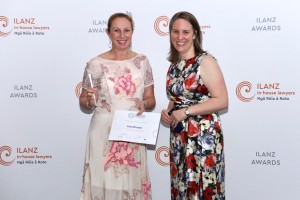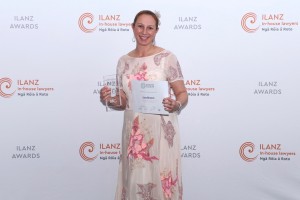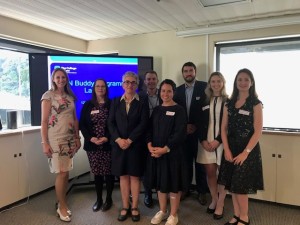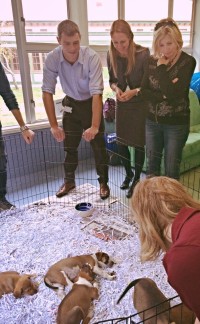Interview with 2022 Award Winner - Lisa Brown
How did it feel to win the MC Public Sector In-house Lawyer of the Year Award?
Initially I was quite taken aback to find out I had been nominated and thought at first there was some mix up with another Lisa Brown! (It is a common name after all…)
To find out I had won on the night was an even greater shock, evident by my obviously unprepared, Gwyneth Paltrow style, acceptance speech!
The theme for the gala dinner was ‘secret garden’ and I thought it would be funny to wear gumboots (you can take the girl out of Mosgiel….) - This was a decision I came to regret when my name was called out and as I nearly tripped up the stage, on my way to collecting the award! However, once the shock had worn off (and I had changed into my dancing shoes) I was literally dancing for joy!
I remain grateful to ILANZ and Meredith Connell (the sponsor of the award) for this award and to my former amazing colleagues, Julie Wotton and Nicci Coffey for their nomination. I was so touched by the references provided in support from internal and external colleagues that I had worked with. None of my achievements, not lest my achievement at ILANZ, would have been possible without all of these wonderful people and so it was a humbling experience to have won – particularly given the outstanding talent in my category from Ben Hamlin and Ala Sonti.


What was your highlight at the 2022 ILANZ Conference?
There were so many memorable presenters and thought provoking sessions at ILANZ 2022. A highlight though was definitely hearing Dr Paul Wood speak. His ‘delinquent to doctor’ life story was truly inspiring and proves that redemption, rehabilitation and reintegration into society after serious criminal offending can work and that great things can be achieved if you set your mind to it.
I think one of the best things about ILANZ conferences though has to be the whakawhanaungatanga and the connections (and reconnections) you make getting together with 400+ lawyers from around the motu, in one place. I bumped into former colleagues, old friends from law school and profs, and made plenty of new friends and connections too.
Te Pae Conference Centre deserves a mention as well as it is a beautiful piece of architecture and a first class venue. The food and catering was exceptional. I seem to have a lot of photos from the conference with the food!
MPI is a large organisation. How did you tackle improving processes and/or prosecution function?
I spent 17 years in the UK on my extended O E and 8 years working with the Crown Prosecution Service in Kent and London, before joining MPI. It was interesting to come home and see that the challenges facing prosecuting agencies and regulators in NZ were not dissimilar from those facing the CPS (and other prosecuting agencies) in the UK. You can go halfway around the world and then end up right back where you started!
E and 8 years working with the Crown Prosecution Service in Kent and London, before joining MPI. It was interesting to come home and see that the challenges facing prosecuting agencies and regulators in NZ were not dissimilar from those facing the CPS (and other prosecuting agencies) in the UK. You can go halfway around the world and then end up right back where you started!
There were a number of things that my team and I tackled at MPI to improve the prosecution function:
- Consistency in prosecution decision-making : which was addressed through the introduction of a revised decision maker template, guidance and training to decision-makers, dip sampling and peer review and the movement of files around the country to help identify and overcome regional inconsistencies.
- Development of a file standard and templates to ensure consistency in MPI’s prosecution files to reduce time spent reinventing the wheel. Templates were developed for everything from briefs to counsel, file reviews, disclosure index and letters, submissions opposing s 106 applications, name suppression applications, sovereign citizen challenges as well as common sentencing submissions for animal welfare and fisheries offending, together with case law libraries of the same. Considerable time was spent investing in a Prosecution File Flowchart which was the brain child of Martin Bannan, a senior solicitor (and genius!) within the team. This flowchart identified the demarcation of responsibilities between OIC, decision-makers and prosecutors and provided each with the guidance and templates needed to perform their roles. It became the “go to” for the “how to” for prosecutions at MPI and transformed the prosecutions induction process.
- Improved systems for reporting on prosecution outcomes from court and recording outcomes on investigations and file reviews. I’m a big believer in using data and evidence from past performance to inform future performance and to help identify indicators to measure “good performance”. This in turn helped the team to be less reactive and more prescient about their work. And provided more accurate and relevant reporting information for penalty schedules in prosecutions; and OIA responses.
- Closer working with client teams: a number of initiatives were implemented to develop closer working relationships with various client teams including drop in Q&A sessions led by a Prosecutor each week, Newsflashes (articles) on significant case outcomes and lessons learned logs and de-briefing sessions to capture actions arising out of unsuccessful prosecutions. There was a concerted effort to be at the table, (“in the room, not in the way”) - and involved early in our client’s work. Forewarned is forearmed.
It was most definitely a team effort. I was so fortunate to work with such a high calibre prosecutions team, up for trying new things and committed to embedding improvements.
You are involved in many wider legal community groups (list here), including developing the Government Legal Network (GLN) Buddy Programme in 2020. Tell us about this programme and your passion for giving back to the community?
I’ve been involved with mentoring program mes since 2002 when I joined the Hackney Schools mentoring programme in London, one of the pro bono community projects run by Linklaters (where I was working at the time). Flash forward nearly two decades and I was a mentor in MPI’s mentoring programme, when the opportunity came up to volunteer for one of Crown Law’s people plan projects - I naturally felt inclined to pick the GLN buddy programme project.
mes since 2002 when I joined the Hackney Schools mentoring programme in London, one of the pro bono community projects run by Linklaters (where I was working at the time). Flash forward nearly two decades and I was a mentor in MPI’s mentoring programme, when the opportunity came up to volunteer for one of Crown Law’s people plan projects - I naturally felt inclined to pick the GLN buddy programme project.
Over a period of 10 months or so, our project team made up of volunteer lawyers from across government, put together a programme which continues to this day. The scheme provides new to government lawyers with a buddy to support them navigating their new experiences as a government lawyer and the machinery of government and provides them with information and guidance on everything from how the rule of law works in NZ, to where the best places in Wellington are to get coffee!
I have had the privilege of being a buddy twice so far to two wonderful government lawyer wahine, who have probably taught me more than I have them! I can say from first hand experience that it is a thoroughly worthwhile and rewarding experience for both buddies. You don’t need to be in the same city to participate. With my two buddies we enjoyed virtual coffee dates.
You had a key role in establishing the Animal Welfare Practise Group. Tell us about your passion for animal welfare.
I have been an animal lover all of my life and  feel lucky to be able to combine my love for animals with my passion for justice and the law. Lawyers can give a voice to those who most need it.
feel lucky to be able to combine my love for animals with my passion for justice and the law. Lawyers can give a voice to those who most need it.
As a species we have a symbiotic relationship with animals – they’re dependent on us and we’re dependent on them for our survival, livelihoods and companionship. Given the great value they hold and that we place on them in society, I believe as lawyers that we have a responsibility to advocate for their best interests and to ensure the highest standards of animal welfare are enforced. The Prosecutions Practice Group was set up to improve outcomes in animal welfare investigations and prosecutions. It brings together committed senior representatives from the Crown Solicitor network (BVA Law), SPCA, MPI and NZVA to discuss common areas of interest in animal welfare: including operational policy, legislative changes, case outcomes, training, and scientific/expert evidence, all in the spirit of achieving best practice in animal welfare prosecutions and the best outcomes for Aotearoa's animals.
I recently joined Te Papa Atawhai (the Department of Conservation) and have therefore handed the chair position over to the very capable Brett Lahman, General counsel at SPCA, though given the critically important role that DOC plays in protecting NZ's wildlife and marine mammals, I can see potential for DOC also contributing to this group in the future.
What would you say to someone thinking about nominating themselves or someone else for an award?
I would encourage anyone thinking of nominating someone they work with (or themselves) to do so. It is such a meaningful way to acknowledge someone’s talent or a team’s excellent work and I don’t think you can ever celebrate success enough. It felt so special to have been nominated and I was immensely grateful for the references provided in support from clients, and internal and external colleagues I had worked with on various things. Reading all of their kind words was prize enough for me and something I will always cherish - to win was the icing on the cake.
And if you do happen to be a lucky nominee, my advice for the night would be:
- Prepare an acceptance speech!
- And don’t wear gumboots!!
